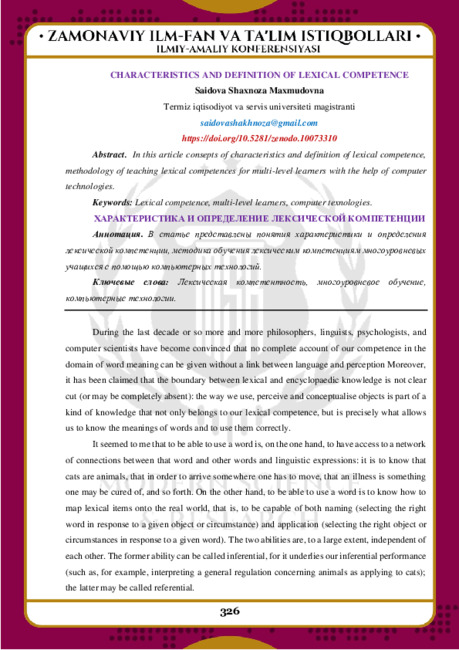
326
CHARACTERISTICS AND DEFINITION OF LEXICAL COMPETENCE
Saidova Shaxnoza Maxmudovna
Termiz iqtisodiyot va servis universiteti magistranti
https://doi.org/10.5281/zenodo.10073310
Abstract.
In this article consepts of characteristics and definition of lexical competence,
methodology of teaching lexical competences for multi-level learners with the help of computer
technologies.
Keywords:
Lexical competence, multi-level learners, computer texnologies.
ХАРАКТЕРИСТИКА И ОПРЕДЕЛЕНИЕ ЛЕКСИЧЕСКОЙ КОМПЕТЕНЦИИ
Аннотация.
В статье представлены понятия характеристики и определения
лексической компетенции, методика обучения лексическим компетенциям многоуровневых
учащихся с помощью компьютерных технологий.
Ключевые слова:
Лексическая компетентность, многоуровневое обучение,
компьютерные технологии.
During the last decade or so more and more philosophers, linguists, psychologists, and
computer scientists have become convinced that no complete account of our competence in the
domain of word meaning can be given without a link between language and perception Moreover,
it has been claimed that the boundary between lexical and encyclopaedic knowledge is not clear
cut (or may be completely absent): the way we use, perceive and conceptualise objects is part of a
kind of knowledge that not only belongs to our lexical competence, but is precisely what allows
us to know the meanings of words and to use them correctly.
It seemed to me that to be able to use a word is, on the one hand, to have access to a network
of connections between that word and other words and linguistic expressions: it is to know that
cats are animals, that in order to arrive somewhere one has to move, that an illness is something
one may be cured of, and so forth. On the other hand, to be able to use a word is to know how to
map lexical items onto the real world, that is, to be capable of both naming (selecting the right
word in response to a given object or circumstance) and application (selecting the right object or
circumstances in response to a given word). The two abilities are, to a large extent, independent of
each other. The former ability can be called inferential, for it underlies our inferential performance
(such as, for example, interpreting a general regulation concerning animals as applying to cats);
the latter may be called referential.

327
I later discovered, thanks to Glyn Humphreys and other neuro-psychologists, that empirical
research on brain-injured persons confirmed, to some extent, the intuitive picture of lexical
competence I had been sketching. Inferential and referential abilities appeared to be separate.
Our second set of research directions concerns the inter-relationships between or across the
aforementioned micro-, meso-, and exo-levels. Several researchers have examined the importance
of cross level studies to examine how two or more levels interact and contradict/complement each
other. Many of the extant studies do not explicitly adopt the TPACK lens. However, we provide
these examples to highlight how TPACK can provide a deeper understanding of ICT integration.
At the micro-level, the study evaluated how this ICT tool was usable for the teachers and students.
At the meso-level, the study examined how the tool affected learning related to the school context.
Next, the study described how this tool integrated with the museum, bridging the museum-
classroom gap. This in essence is the exo-level. The study found that the tool could help extend
the museum artifacts into the classroom context. The teacher’s TPACK of designing the pre- and
post-museum visits was important in helping the learners appreciate the experience and learn with
the technology which explains how the “development and dissemination of professional
knowledge as it relates to teaching and learning that incorporates information and communications
technology” (p. 426) evolved and eventually transformed a community. Using the micro-, meso-,
and macro-levels, the paper describes how the InterActive Education project has developed
teachers’ professional knowledge, and transformed the respective schools and their wider
communities.
The study emphasized the meso-context of a knowledge-building teacher network where
these teachers would design and implement technological innovation projects. In addition, Zhang)
examines the interaction between the macro- and micro-levels in an East Asian learning culture.
Macro-level elements are social values and power structures. Micro-level elements include
resources and technologies, curriculum guidelines, assessment of learning, and learning tasks,
activities and procedures. The author argues that ICT integration requires a principle-based rather
than a procedure-based approach. This will engage teachers and allow them to deeply innovate
with ICT.
REFERENCES
1.
Arutyunova N. D. Diskurs / N. D. Arutyunova // Katta ensiklopedik lug‘at.
Tilshunoslik. - M., 1998. - S. 136-137.

328
2.
Bogdanov VV Matn va matnli aloqa / VV Bogdanov. - Sankt-Peterburg: Sankt -
Peterburg nashriyoti. davlat unta, 1993. - 68 b.
3.
Kibrik A. A. Diskurs va funksionalizmning paydo bo‘lishi / A. A. Kibrik, V. A.
Plungyan // Zamonaviy Amerika tilshunosligi: asosiy yo‘nalishlar. - M.: URSS
tahririyati, 2002. -S. 307-309.
4.
Chafe V. Diskurs, ong va vaqt. Nutq va yozishda ongli tajribaning oqimi va o‘zgarishi
/ Chafe V. - Chikago: Chikago universiteti. - Matbuot, 1994 yil.
5.
Daniyalik Fr. A. Sintaksisga uch darajali yondashuv / Daniyaliklar Fr. A.- Travaux
linguistigue de Praga, 1966. -P. 56-58.
6.
Enkvist NE Matndan talqin qilinishiga: matn tilshunosligidagi asosiy atamalarni
muhokama qilishga hissa. Bog‘lanish va uyg‘unlik : matn va nutq tahlili / Enkvist NE
- Nyu-York, 1989. - P. 369-382.





